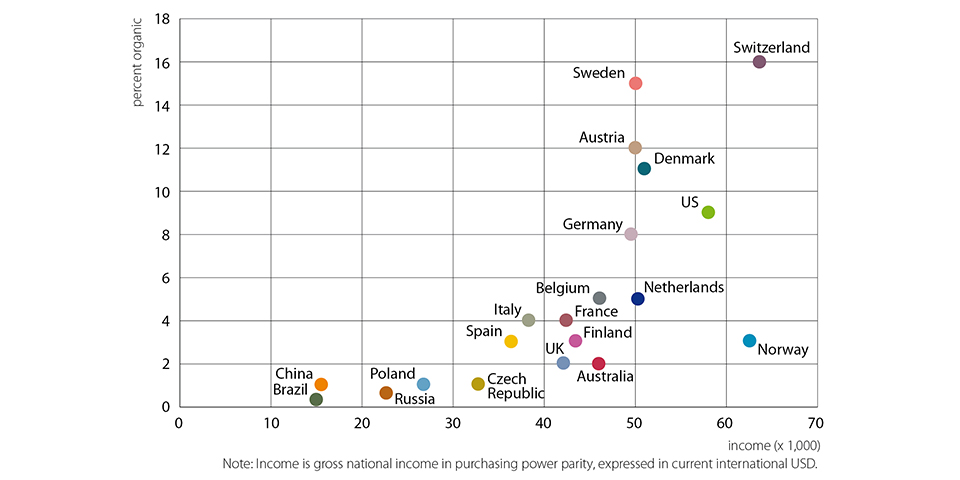
Bilgi

Global warming, prevention of lifestyle diseases or simply because it tastes good. The global consumption of organic products is increasing. An illustration of the growth.
Globally, people are eating more and more organic products. In January 2018, RaboResearch Food & Agribusiness published the World Vegetable Map, listing the percentage of organic consumption per country in relation to income (see figure). At first glance, it appears to be a case of: the richer, the bigger the growth. But that is not entirely true. People in the Netherlands and England can afford it, but only 5% opt for organic.
America is not the first country that springs to mind when you think of healthy eating. Nevertheless, they are making the most progress when it comes to organic fruits and vegetables. For various reasons. “One of these reasons is the growing awareness that there are limits to the extent to which we can exhaust the earth’s resources,” according to Erica Renaud, Regional Business Manager at Vitalis Organic Seeds North America. “Millennials want to know where their food comes from and have a preference for quality, an authentic production process and good labour conditions over a food production system driven by cost price. They want healthy food that contains vitamins, in the hope of preventing possible lifestyle diseases. Young people pay more attention to this theme than their parents and grandparents. Bestsellers about nutrition and opinions of chefs and food bloggers encourage these feelings.”
Researchers estimate that the total market for organic products worldwide is 90 billion dollars per year. America with its 39 billion dollars is followed by... Germany with 9.5 billion dollars, France with 6.7 billion dollars and China with 5.9 billion dollars. Germany in particular is a striking example. They have a long history of natural education and information in the field of nutrition and health. And the German growers are able to sell their products in supermarkets under a special label ‘Junior Heroes’ during the three-year transition to organic farming. A sympathetic name that is also promoted by supermarkets. There are also organised organic associations, such as Naturland and Bioland. Not only do they support the growers during the transition phase, they also set criteria for fully organic cultivation that are sometimes more stringent than the official EU standards. One of the most important criteria is the use of organic seed, if available. In order to guarantee this availability, these associations work together closely with organic vegetable breeding companies such as Vitalis.
In the United Kingdom, the consumption of organic products is slowly starting a revival, but the decreasing spending power is not helping. Organic meal boxes are gaining popularity with the real fans. Companies such as Abe & Cole and Riverford deliver millions of boxes annually. In the Netherlands, the health food stores account for the largest share. The younger organic concepts, such as Eko Plaza and Marqt, appeal mainly to the millennials. However, the major Dutch retails have also embraced organic. In the fresh produce section, we see that small products are only available as organic products. Sometimes a consumer does not even realise this.
New countries, such as China, are also working on this. For example, increasing numbers of supermarkets are offering organic alternatives, thereby hoping to distinguish themselves from the ‘wet markets’, where the vast majority of fruit and vegetables are sold. However, the Chinese people do have to pay 30 to 50% more for this. The growth of organic in China is probably also due to recent food scandals. People are opting for organic or products with a traceable origin rather than unreliable, anonymous standard products. The awareness surrounding organic is also growing in Poland, Ukraine and Russia. It is mainly the richer households that are able to make this choice. We expect that it will take a while before organic vegetable production really gains ground, as the population is still quite conservative.
In short: the demand for organic products will only increase. And so there needs to be enough organic seed available. “A lot of new varieties emerge from the breeding programme at Enza Zaden, once extensive organic field trials have proven that they are suitable for organic farming and contain sufficient resistance. It is a major challenge to keep up with the growth of the organic sector. According to European legislation, growers can only receive exemption for the use of untreated standard seed if no organic seed is available, but that is an exception. Large, specialised organic vegetable growing companies can focus extra attention on demanding varieties within their product range. But all-round growers, who grow a lot of different products, need to be able to count on robust, reliable varieties that can withstand suboptimal growing conditions.”

In February 2018 Rabobank Food & Agribusiness Research published a World Vegetable Map including this chart with the popularity of organic vegetables. The share of organic in total spent on vegetables is somehow related to the average income of that country according to World Bank data.